If you could wave a magic wand and make one dream happen for your business, what would it be? Would it be an influx of cash? Or to go viral on TikTok? Or what about growing your website’s traffic tenfold?
The truth is, there’s no magic wand when it comes to business success. But here at First Page Strategy, we like to think we specialize in the next best thing: data-driven content. It’s the future of marketing, and if you aren’t on board already, we’re here to help you hop on.
Our guide below shows you how to find trending topics via various tools and how to use those trends to create a campaign that delivers.
How the Seasons Affect Your Customers
We all know the biggest consumer spending seasons: Christmas, Halloween, Black Friday, and Back to School. But if you aren’t an online retailer or shopping website, these holidays might not be that applicable to you. Though, that doesn’t mean you need to ignore seasonality entirely.
Every brand is affected by seasonal spending trends in one way or another. The trick is using data to discover how your customers behave throughout the year and why so that you can create campaigns tailored to when your customers are most likely to engage.
But enough generalizations. Let’s dive into the tools you need to get started with data-driven marketing.
Data Analysis: 5 Tools to Find What’s Trending
From gathering internal insights to taking a look at what’s trending on social media, the following trending data tools will help you discover what topics are hot in your industry and how you can capitalize on these trends to bring in new traffic.
1. Google Analytics
First, we’ll start with the most obvious — Google Analytics (GA). While you won’t be able to see search trends from a birds-eye view, the benefit to using GA for trending research is that you get to see exactly how your audience is behaving with the content you currently have published.
This means you will better understand how your audience behaves over time, so you can cater future campaigns to the people you already know are interested in what you have to say.
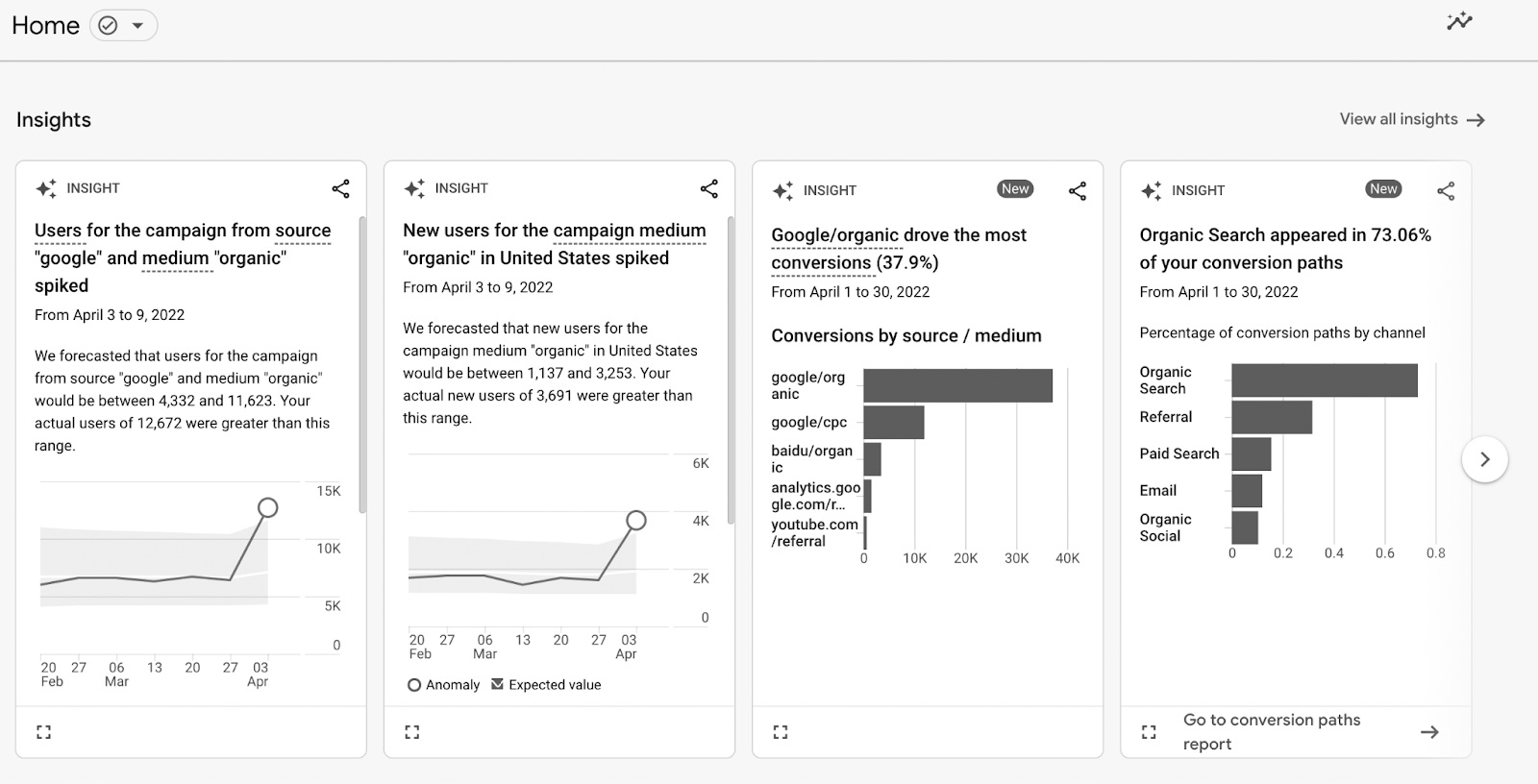
In fact, GA4 (the most recent version of GA) has an entire “Insights” section on your home dashboard dedicated to this exact purpose. On “Insights,” you can check out what Google has discovered about the way your audience interacts with your brand and even set custom insights to have Google dig for data that’s important to you.
In addition, you can navigate to Reports > Engagement > Pages and Screens and filter by URL and date to see how many page views certain URLs are getting over time, how long users are active on each page, and much more. Basically, the sky’s the limit to what you can discover in GA4 as long as you are willing to dig for the data you need!
2. Google Trends
Google does it all! In addition to diving deep into your internal data in GA4, as mentioned above, Google also has a tool that allows you to see search engine trends across the globe.
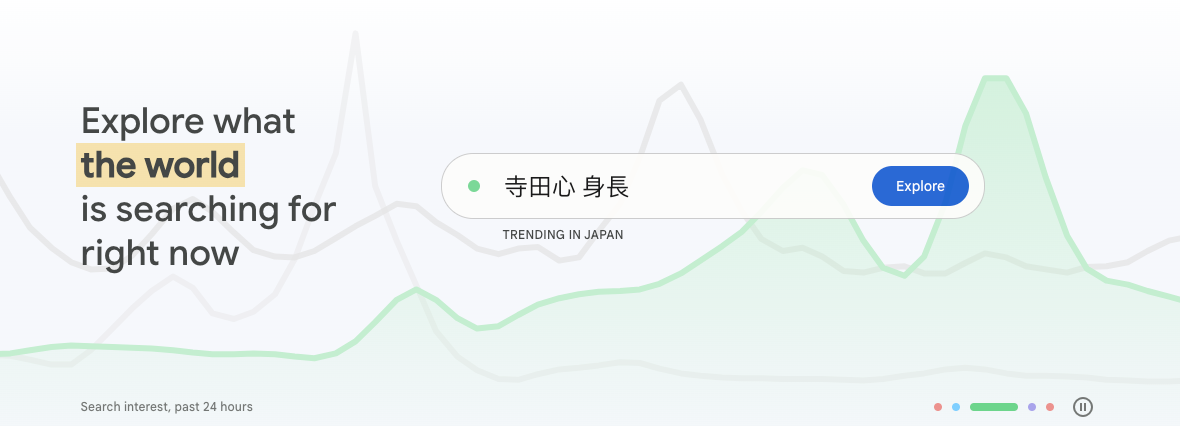
Check out their insights page to learn more about the biggest topics at the moment, or conduct your own research by entering terms into the search bar that are relevant to your brand. If you're a food blogger, for instance, you might search for terms like “vegan dinner ideas” or “best vegan meat substitutes” to see when people are most likely to search for things you want to write about.
Then, you can filter your results by time frame and location and even compare terms to one another. These results will help you determine when to create content that is catered to search trends and when to pull back on ideas that may not be of interest to your readers during a particular season. For more information on how to use Google Trends, check out Google’s guide.
3. Buzzsumo
While most of the trending tools on this list focus on what’s trending on Google, Buzzsumo does things a little differently. By focusing exclusively on social media networks like Facebook, X, Pinterest, and Reddit, Buzzsumo’s content analyzer tool is perfect for social media managers looking to see how certain topics are trending and which are going viral.
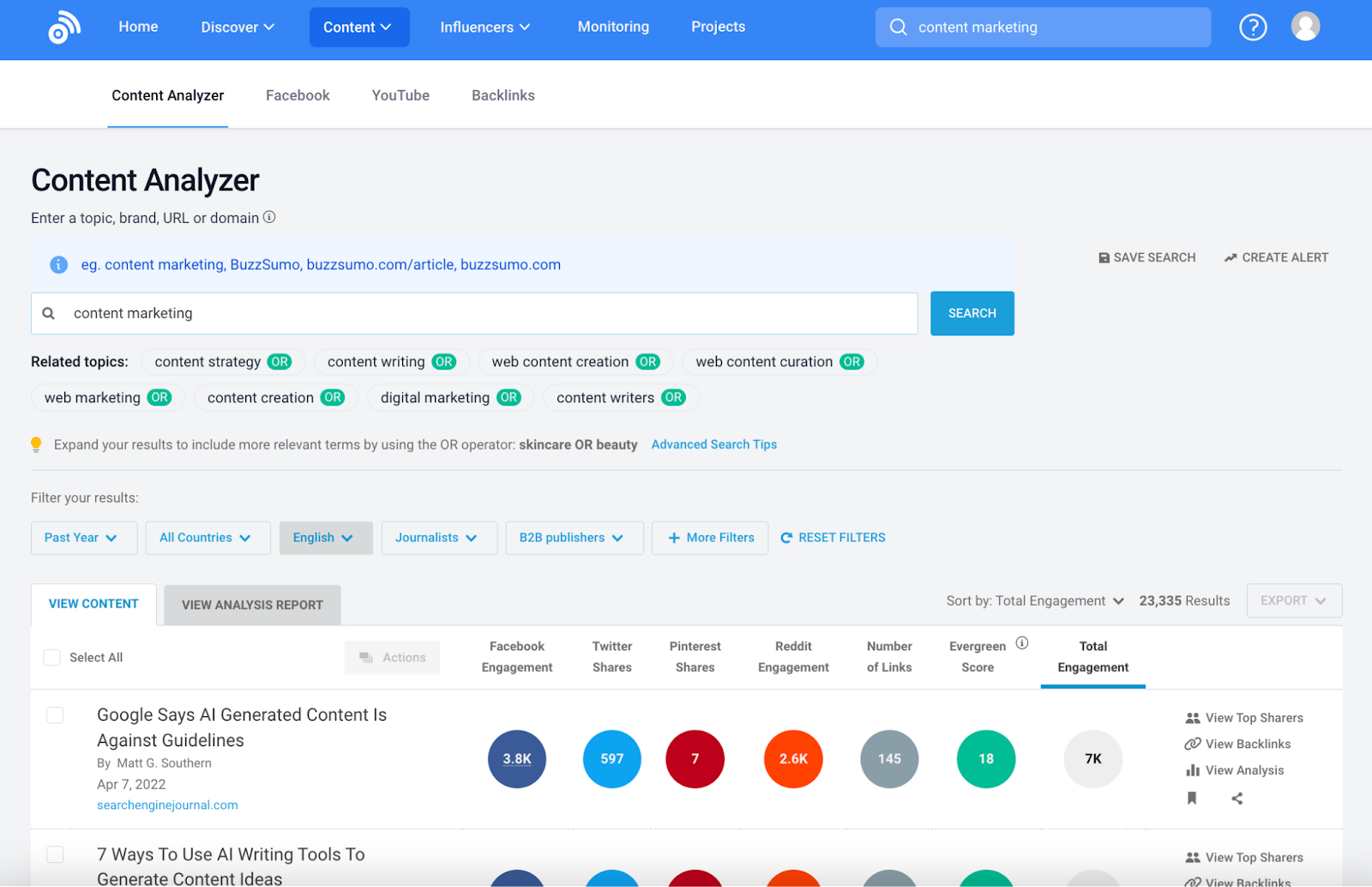
Their tool also gives you an inside look at related trending topics, engagement rates per platform, how evergreen each piece of content is, and what format is working best for your potential audience. Ready to get started researching? Learn more about how to use their content analyzer on their blog.
4. Exploding Topics
Learn more about what’s trending in your industry, get granular with growth over time, and get all the data you need delivered straight to your inbox by signing up with a company like Exploding Topics.
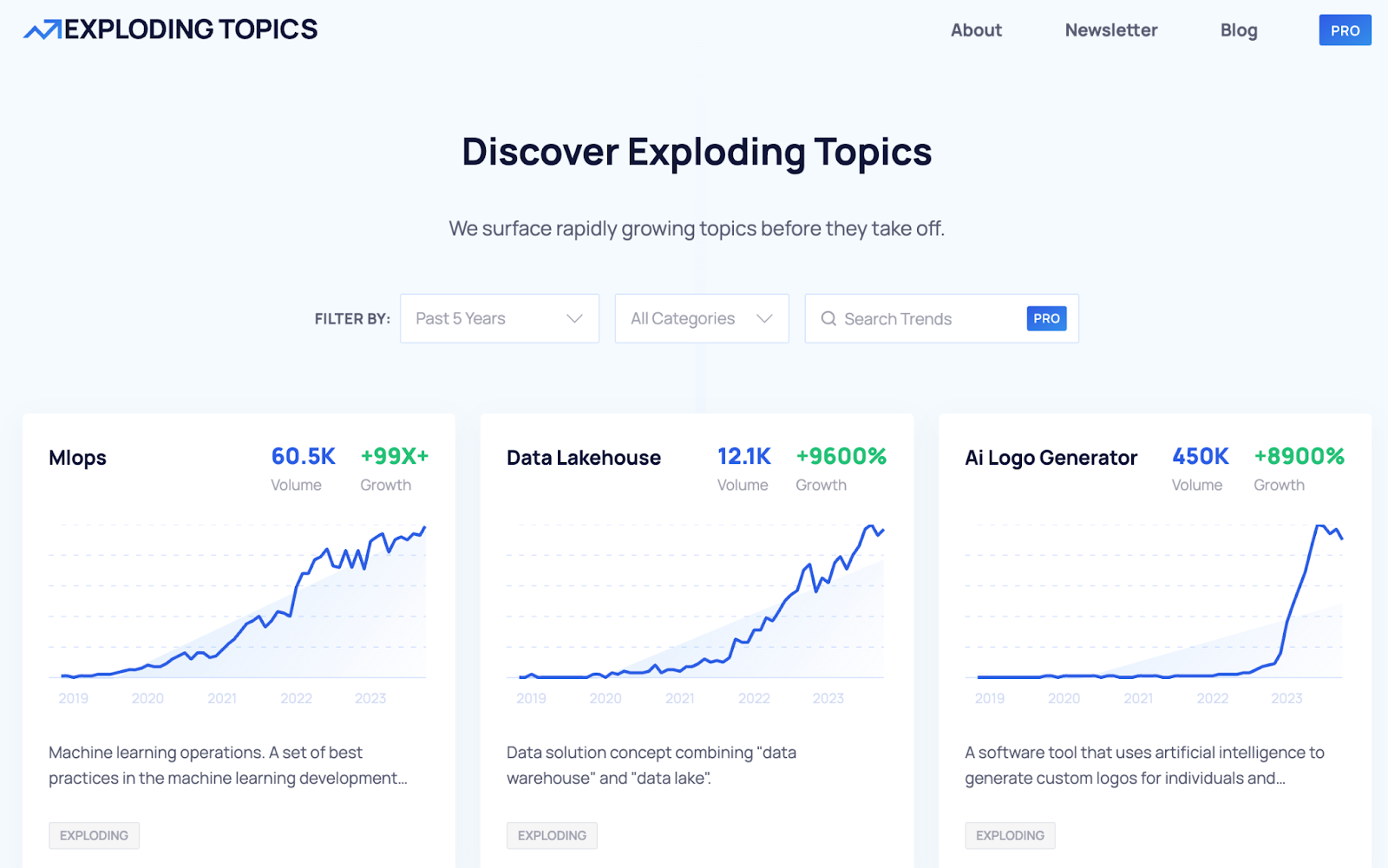
While there are a few other websites doing similar things (TrendWatchers and Treendly, to name a few), Exploding Topics offers a plethora of data that just can’t be beat. Filtering is available by category, time frame, and specific terms. In addition, they have an email tool that will let you know of brand-new topics that are picking up steam before you even think to search for them.
5. Ahrefs
Did you know you can find trending search terms via Ahrefs? That’s right, everyone’s favorite SEO tool has a few tricks up its sleeve, including the ability to take a look at everything that’s on the internet for a certain keyword or topic.
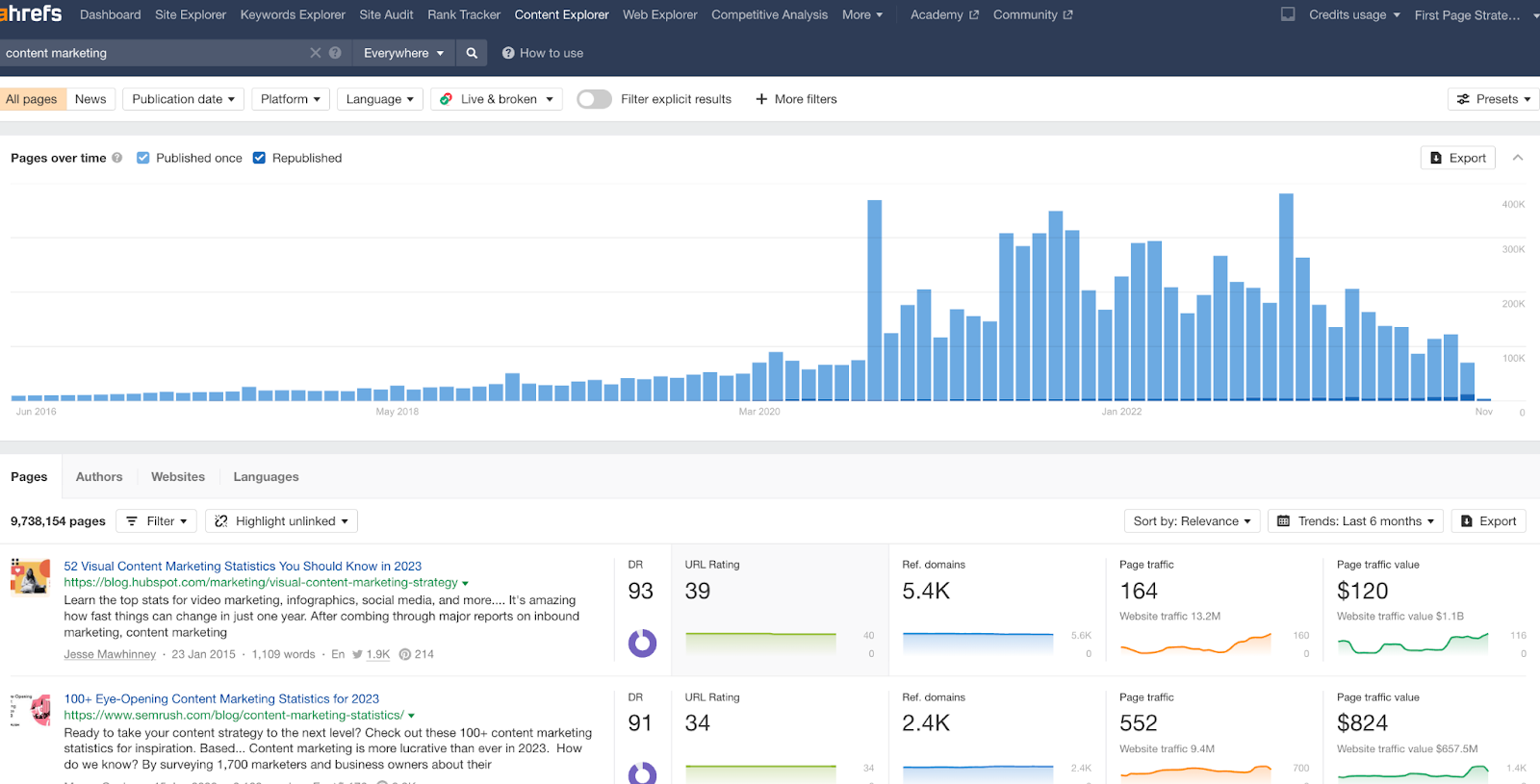
Simply type in a word or phrase into their content explorer to get an in-depth look at what people are writing about within that subject. You can filter by publication type or date, domain rating, and even different languages.
Bottom line: Ahrefs content explorer will not only give you an idea of how a certain topic is trending over time, but it will also let you see how a variety of brands are covering the topic so you can make sure that your campaign stands out from the crowd.
Turning Trends Into Campaigns
Once you’ve done the data digging, it’s time to turn those trends into real-world campaigns (also called data storytelling). While there are a plethora of campaigns you can create depending on the season, here are a few of our tried-and-true tricks for coming up with a killer data campaign.
- Showcase a customer pain point (and how you help solve it) with a case study.
- Did you discover that a lot of people are searching for a solution to a problem that you can help them solve? Interview some of your current clients — focusing specifically on the problem you uncovered — and create a case study showcasing how you helped them. It's even better if you can back it up with numbers from the client!
- Create a topic cluster of keywords — then get to writing!
- Topic clusters are an advanced SEO strategy that helps to solidify your brand's expertise in a certain subject by dominating the SERP for a majority of keywords around that term. By finding and targeting keywords in all stages of the buyer's funnel around a certain topic, you can capture potential customers no matter where they are and help push them down the funnel.
- Use historical data to plan for the future.
- We all know that creating a campaign and seeing results takes time. Get ahead of the game by looking at seasonal trends for seasons that are a few months away. By analyzing historical data, you can predict how your customers will react and create a campaign that will be ready to capture users by the time they actually go searching for it.
- Create reports around your biggest trends.
- If you are noticing a trend in your industry that’s just starting to take off, capitalize on that growth by creating an in-depth analysis of the subject. Conduct research, interview, analyze data, and create a write-up to help showcase your expertise in the subject. Then you can use that report to gain high-authority backlinks or put it behind a gate to help capture user emails.
We’ll Dig for Data. You’ll Reap the Benefits.
Let’s state the obvious: everyone knows that data analysis is key to successful marketing. But finding the time to dig for that all-important data, analyze it, and create the campaign? That’s easier said than done. But it doesn’t have to be.
When you hire a data-focused marketing agency like First Page Strategy, you’ll get all the benefits of data-focused marketing without having to do any of the leg work yourself. Learn more about our analytics consulting services and how we can help your brand shine — then contact us to get started!







